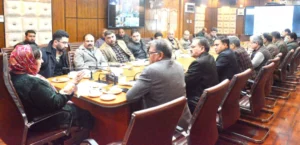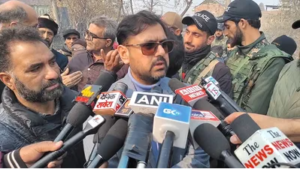Ghoal -(Afsanche) by Dr Roquiya Jama


RAYEES AHMAD KUMAR
Writer is a columnist hailing from Qazigund Kashmir. l
…………………………
Roquiya Jamal hailing from the Bhudruk district of Odisha is one of the towering fiction writers of India. Her stories are recognized and given a space by leading and widely read dailies and monthly journals across the subcontinent. Her first short story, Lashon Ke Sodagar was immensely appreciated by readers which catalyzed her passion to write ahead. Currently her short story collection which is under my overview is titled “Ghoal”, published by Arshia Publications and spanning over 128 pages. It’s Title page is adorably designed boasting superior quality paper inside and containing a set of 80 tactfully composed micro fictions. This Micro-fiction collection is probably the maiden one in the literary history of Odisha. Apart from being an academician and poetess, Roquiya Jamal has proven through her Micro-fictions and other short stories that she is an avid fiction writer also. The author has dedicated this precious collection to her parents, mother Mehrunisa and father Sheikh Abu Sufyan. Syed Rehmani while commenting over the literary contributions of Roquiya Jamal makes it clear that she nourishes the rich literary landscape of Odisha. She once organised an international Seminar through UGC titled Urdu Zaban Qoumi Yakjahati Ki Alamat in Odisha. She is a skillful poetess too and has written hundreds of poems and Ghazal which will soon be transformed into a collection. Rownaq Jamal is all praise for the author in his three page note on the technique and writing skills of Roquiya Jamal. He draws a sketch of how he came to develop acquittance with author during Corona lockdown, when everyone was locked indoors and lady fiction writers began to share their stories on social media platforms. Ahmad Kamal Hashmi has written an excellent account of the historical background of Microfiction genre of Urdu literature. Getting birth from Minto, given a name by Joginder Paul, this genre was powered by Ratan Singh, Bashir Malerkotli, MA Haq, Manazir Ashiq Harganvi and Rownaq Jamal through their creative stories. He calls Roquiya Jamal as a product of Corona Lockdown and has commended her many stories of the book. Prof Aslam Jamshedpuri says that, Roquiya Jamal is a talented writer and her maximum stories reflect the pain and sufferings of the society in a comprehensive manner. Prominent Microfiction writer of Kashmir, Khalid Bashir Tiligami has also complimented the vibrant efforts of Roquiya Jamal in popularizing this unique genre of Urdu literature. While giving a detailed background of her literary journey and the reason for her tilt towards the fiction writing, Roquiya Jamal says that she was born in an educated family as both of her parents were well educated and they felt pleased to see their daughter authoring a book. She has done her masters in Urdu bagging a gold medal and it was the time when she began writing critical essays. Writing a critical essay on Moulana Abdul Kalam won her prestigious Saarc International Award through the August hands of Vice President of India. She says it was the Corona Lockdown when her passion to write fiction grew. Chote Loug(35)- the opening story of the book reveals the inhuman attitude of affluent and well-to-do people towards their maid servants in the home. Chhei Nimazein(36), reveals the heartbreaking and agonizing conditions of the people of Iraq, Palestine, Seria and Afghanistan who attend a funeral of their loved ones on daily basis. Ghoal (38), The title story of the book reflects the lost human values among the people of planet who hardly feel the pain and distressed condition of fellow beings while birds like crows are mourning the death of their like ones impatiently. Khandani Loug(43), depicts the dual character of men as presented by Danyal a character in the short story. Lawaris(52), this one is a powerful slap on the face of humanity because in modern days the beloved parents especially mothers are disowned by their own sons in their old age whom they nourish and educate in their early years. Jhatka(53), reflects the cheating and duping of the matches chosen on Marriage Bureau Websites as is evident in this story through Rema a character. Boaj(57), majority of the wives consider their ailing and handicapped husbands a burden when the disease gets prolonged as is evident in this one. Nasil(58), this one has been meticulously crafted and artistically woven to give a daughter lesson about choosing a match in her life when she was hellbent upon bringing a high breed dog to her home. Gift(59), sometimes mothers who always remain on toes to train their married daughters to act as masters in their newer homes are themselves taught a humanistic lesson by their own daughter in-laws. Same is reflected in this story when a mother in-law is gifted a smartphone by her newly daughter in-law. Panagah(62), For women folk during dark night hours and also in difficult times, no place is considered safer, that is why Noushin an 18 years old daughter prefers to stay in graveyard rather than in a community of humans where drug addicts, thieves and drunkards roam during night hours. Rishte ki Doad(66), domestic violence to women at the hands of women folk viz Mother in-laws and Sister in-laws is now forcing the to be brides to search a match where there is neither spouse’s mother nor sister. Jazba(72), offering a helping hand to someone in dire need and predicament is the virtuous deed a man can do. In this story an advocate has been taught same lesson by his own client. Talaq(73), this one is a clear reflection of divorce being taken as a bolt from the blue by some while accepted amidst happiness by others. Status (75), in the era of social media, a major chunk of unmarried young people are making temporary relationships on social sites and when it comes to tie their nuptials, they prefer to choose the spouses of their status. Same has been nicely portrayed in this story. Ramzan(78), Ramzan the month of vast blessings doesn’t teach us only to help the impoverished and needy ones but also to maintain cordial relationships with our siblings, neighbors and other relatives. This one has been brilliantly composed. Pakad(81), In universities majority of the guides to research scholars aren’t only wasting their precious time and darkening their future but also compelling them to take an extreme step. Same has been nicely sketched by Roquiya Jamal in this story. Khamoshi ka Karab(86), Despite offering a humanistic and noble attitude to our daughter in-laws, the later consider their mother and father in-laws a big burden in their homes. They eagerly wait for their departure as has been found in this story. Majboori(89), In this materialistic world everyone is ambitious of accumulating a big lot of wealth and hardly bother about the urgency of some people. Same is depicted in this story in which Fakhar Alam can’t manage a room on rent to Ikhlaq Ahmad because he shall loose his other non Muslim tenants. Beta(105), This story shows the limits our sons can cross to forget their own beloved parent’s death anniversary and attend an unimportant celebration of his father in-law. Instead a daughter can’t afford to forget her parents ever in her life whatever the circumstances are. Ehsas(126), this is last but one story of the book reflecting the neutral policy of muslim nations towards their fellow Muslims despite seeing them in turmoil and war conditions. While going through the stories of Roquiya Jamal, a reader makes an unequivocal stance that she is a powerful writer and her stories have the capacity to inspire the aspiring writers. Apart from being an apt writer Roquiya Jamal is also a noble lady as I had requested her through social media to send this collection, without wasting a second she dispatched it to me through Indian Post. I shall be grateful to her.









